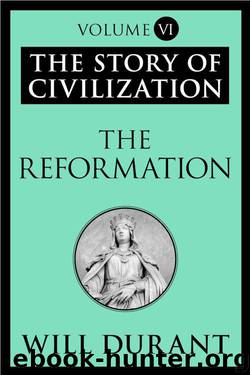The Reformation by Durant Will

Author:Durant, Will [Durant, Will]
Language: eng
Format: epub, mobi
Publisher: Simon & Schuster
Published: 2011-06-06T20:00:00+00:00
III. WOLSEY AND THE CHURCH
He recognized and largely exemplified the abuses that still survived in the ecclesiastical life of England: absentee bishops, worldly clergymen, idle monks, and priests snared into parentage. The state, which had so often called for a reform of the Church, was now part cause of the evils, for the bishops were appointed by the kings. Some bishops, like Morton and Warham and Fisher, were men of high character and caliber; many others were too absorbed in the comforts of prelacy to train their clergy in spiritual fitness as well as financial assiduity. The sexual morality of the curates was probably better than in Germany, but among the 8,000 parishes of England there were inevitably cases of sacerdotal concubinage, adultery, drunkenness, and crime—enough to make Archbishop Morton say (1486) that “the scandal of their lives imperiled the stability of their order.” 23 Richard Foxe, toward 1519, informed Wolsey that the clergy in the diocese of Winchester were “so depraved by license and corruption” that he despaired of any reformation in his lifetime.24 The parish priests, suspecting that their promotion depended on their collections, were more than ever exacting of tithes; some took a tenth, each year, of the peasant’s chickens, eggs, milk, cheese, and fruit, even of all wages paid to his help; and any man whose will left no legacy to the Church ran high risk of being denied Christian burial, with prospective results too horrible to contemplate. In short the clergy, to finance their services, taxed almost as sedulously as the modern state. By 1500 the Church owned, on a conservative Catholic estimate, about a fifth of all property in England.25 The nobility, here as in Germany, envied this ecclesiastical wealth, and itched to recover lands and revenues alienated to God by their pious or fearful ancestors.
The condition of the secular clergy in England was summed up with obvious exaggeration by Dean Colet in an address to an assembly of churchmen in 1512:
Download
This site does not store any files on its server. We only index and link to content provided by other sites. Please contact the content providers to delete copyright contents if any and email us, we'll remove relevant links or contents immediately.
| Buddhism | Christianity |
| Ethnic & Tribal | General |
| Hinduism | Islam |
| Judaism | New Age, Mythology & Occult |
| Religion, Politics & State |
Cecilia; Or, Memoirs of an Heiress — Volume 1 by Fanny Burney(32558)
Cecilia; Or, Memoirs of an Heiress — Volume 2 by Fanny Burney(31956)
Cecilia; Or, Memoirs of an Heiress — Volume 3 by Fanny Burney(31942)
The Secret History by Donna Tartt(19088)
Sapiens: A Brief History of Humankind by Yuval Noah Harari(14389)
Leonardo da Vinci by Walter Isaacson(13336)
The Radium Girls by Kate Moore(12028)
Sapiens by Yuval Noah Harari(5370)
How Democracies Die by Steven Levitsky & Daniel Ziblatt(5218)
The Wind in My Hair by Masih Alinejad(5095)
Homo Deus: A Brief History of Tomorrow by Yuval Noah Harari(4918)
Endurance: Shackleton's Incredible Voyage by Alfred Lansing(4783)
Man's Search for Meaning by Viktor Frankl(4606)
The Silk Roads by Peter Frankopan(4534)
Millionaire: The Philanderer, Gambler, and Duelist Who Invented Modern Finance by Janet Gleeson(4478)
The Rape of Nanking by Iris Chang(4213)
Joan of Arc by Mary Gordon(4110)
The Motorcycle Diaries by Ernesto Che Guevara(4101)
Stalin by Stephen Kotkin(3965)
